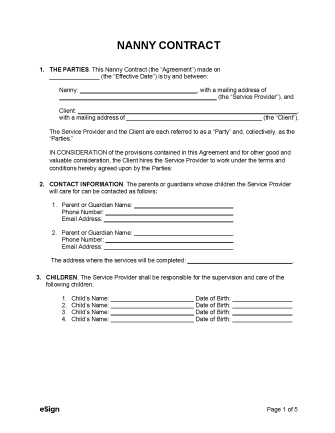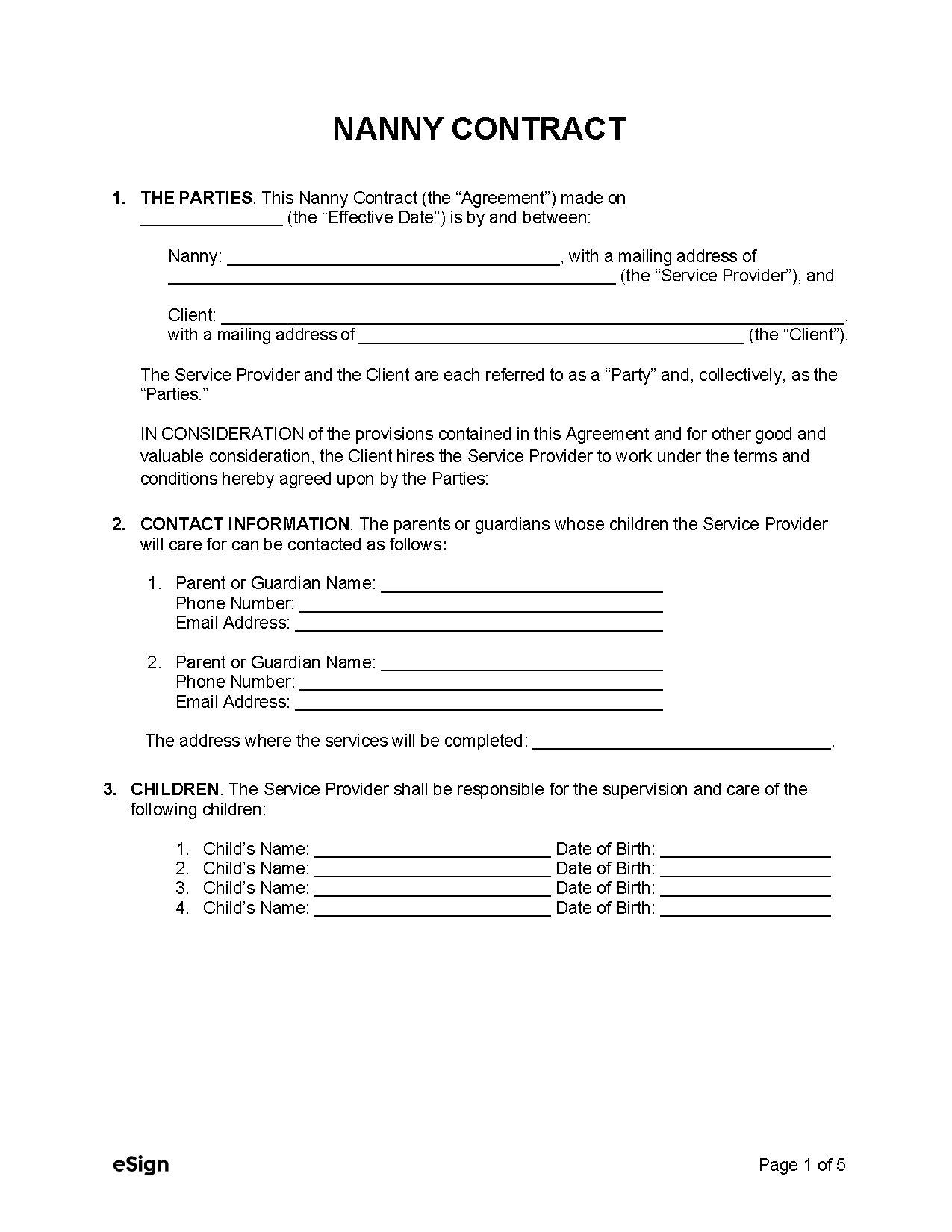Nanny vs. Babysitter
While nannies and babysitters share similar duties in supervising children, nannies are typically hired for longer terms, whereas babysitters work on-call. Nannies generally have more experience or credentials in child care and, in some cases, live with the family.
Why Draft a Nanny Contract
Creating a written nanny agreement contract ensures both parties sign off on and understand the compensation, the work schedule, the nanny’s responsibilities, and all other terms of the working relationship.
A nanny contract is a legally binding document that can hold either party liable if they fail to uphold their end of the agreement.
What’s Included
- Party Information – The full name and mailing address of the nanny and the family. The contract should also include the parents’ phone numbers.
- Children Information – The name, date of birth, and allergy information of each child.
- Services – An overview of the services that the nanny will perform for the family.
- Contract Term – The date the agreement comes into effect and when it will terminate.
- Payment Details – The compensation the nanny will receive and the payment method.
- Work Schedule – The days and hours the nanny will provide services to the family.
- Emergency Contacts/Protocol – The contact information of the individuals that the nanny should contact in an emergency and what actions should be taken.
- Signatures – The signatures of the nanny and the parents to formalize the agreement.
Sample
Download: PDF, Word (.docx), OpenDocument
NANNY CONTRACT
1. THE PARTIES. This Service Contract (the “Agreement”) made on [MM/DD/YYYY] (the “Effective Date”) is by and between [NANNY NAME], with a mailing address of [NANNY ADDRESS] (the “Service Provider”), and [PARENTS’ NAMES], with a mailing address of [PARENTS’ ADDRESS] (the “Client”).
2. CONTACT INFORMATION. The Client can be reached at:
Parent Name: [CONTACT NAME] Cell Phone: [PHONE #] Work Phone: [PHONE #]
Parent Name: [CONTACT NAME] Cell Phone: [PHONE #] Work Phone: [PHONE #]
3. CHILDREN. The Service Provider shall be responsible for the supervision and care of the following children:
Child’s Name: [CHILD NAME] Date of Birth: [CHILD DOB]
Child’s Name: [CHILD NAME] Date of Birth: [CHILD DOB]
4. SERVICES. The Service Provider agrees to provide the following: [DESCRIBE SERVICES TO BE PERFORMED]. Hereinafter known as the “Services.”
5. TERM. The term of this Agreement shall commence on [MM/DD/YYYY] and terminate: (check one)
☐ – On the date of [MM/DD/YYYY]
☐ – Other [OTHER TERM]
6. PAYMENT AMOUNT. The Client agrees to pay the Service Provider $[RATE]/Hour for the Services.
7. SCHEDULE. The Service Provider will adhere to the following schedule: [DESCRIBE NANNY SCHEDULE].
8. ROOM AND BOARD. The Service Provider acknowledges that they reside in separate housing from the Client and that the Client has made no intentions of providing room or board to them.
9. ALLERGIES. It is known that the child(ren):
☐ – Do not have any known allergies.
☐ – Have the following allergies: [INDICATE CHILD AND ASSOCIATED ALLERGIES]
10. EMERGENCY CONTACTS. In the case of emergency, the Service Provider should contact:
Emergency Contact Name: [EMERGENCY CONTACT NAME]
Phone Number: [EMERGENCY CONTACT PHONE NUMBER]
Relation: [EMERGENCY CONTACT RELATION]
Emergency Contact Name: [EMERGENCY CONTACT NAME]
Phone Number: [EMERGENCY CONTACT PHONE NUMBER]
Relation: [EMERGENCY CONTACT RELATION]
11. EMERGENCY PROTOCOL. [DESCRIBE EMERGENCY PROTOCOL]
12. ADDITIONAL TERMS AND CONDITIONS. [ADD ADDITIONAL INSTRUCTIONS, TERMS, CONDITIONS].
IN WITNESS WHEREOF, the Parties hereto agree to the above terms and have caused this Agreement to be executed in their names.
Client’s Signature: _________________________ Date: _______________
Printed Name: _________________________
Client’s Signature: _________________________ Date: _______________
Printed Name: _________________________
Nanny’s Signature: _________________________ Date: _______________
Printed Name: _________________________

